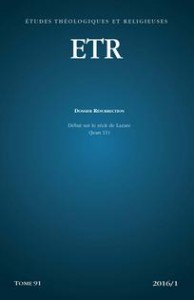Quelle justice évoque Matthieu lorsqu’il utilise le mot dikaiosunê ? Priscille Morel analyse cette notion centrale de la théologie matthéenne à partir des diverses occurrences du terme et, plus particulièrement, des versets 3,17 ; 5,20 et 21,32. Au fil de l’Évangile, le lecteur découvre que Jésus confère sa pleine puissance de vie à la justice lors du baptême de Jean, que celle-ci s’avère indispensable pour entrer dans le royaume des cieux et que c’est par ce même baptême que la justice est reçue. Cependant le croyant continue d’en avoir soif et faim, il se doit même de la rechercher, car loin d’être acquise, elle se présente comme un cheminement. Au terme de l’Évangile, il détient les éléments lui permettant de saisir cette notion de justice et d’en modifier la compréhension qu’il pouvait en avoir : une metanoia est alors à l’œuvre par le truchement de la narration matthéenne.
What does Matthew mean by the word righteousness, which translates dikaiosunê? Priscille Morel examines this central notion of Matthew’s theology in the light of several passages of his Gospel, most notably 3:17, 5:20, and 21:32. The reader of the First Gospel discovers that Jesus gives full power of life to justice on the occasion of John’s baptism, that without justice the heavenly Kingdom cannot be entered, and that it is by way of baptism that justice is received. While the quest for justice is an ongoing process, the end of the Gospel provides the reader with the clues that allow him or her to grasp what is at stake: in its very narrative, Matthew’s Gospel is meant both to report and produce a change of mind, a true metanoia.
p. 35-55
Auteur
MOREL Priscille
Priscille MOREL est docteur en théologie et en littérature grecque. Elle est chercheur associé à la Faculté Libre de théologie protestante de Montpellier où elle a soutenue sa thèse de doctorat.
